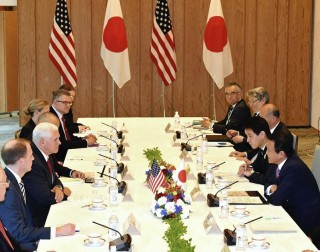Loading
Search
▼ Japan Aims to Skirt Clash with U.S. Over Cars, Beef, Currency
- Category:Event
Automobiles, agricultural products and foreign exchange policy are three areas that are expected to be the subjects of heated debate in the Japan-U.S. economic dialogue.
The U.S. auto industry and agricultural organizations are pressuring the U.S. administration to demand that Japan open up its markets, an effort that is gaining steam.
The next session is scheduled to take place in the United States sometime this year, but the Japanese government feels there are no easy compromises to make in these areas, and so would like to avoid discussing them, observers said.
Philip Seng, president of the U.S. Meat Export Federation, which is made up of livestock organizations, food producers and others, called on Japan to lower tariffs on imported beef and other products at a press conference in Tokyo on Tuesday.
He emphasized that he hoped a free trade agreement between Japan and the United States could be concluded as quickly as possible.
The U.S. auto industry also sees this as an opportunity to gain an advantage over Japanese makers.
Members of the administration of U.S. President Donald Trump have criticized Japan over automobiles, and expressed concern over things such as Japan’s unique standards for minicars and its vehicle inspection system.
For instance, Peter Navarro, the director of the U.S. National Trade Council, has accused Japan of having high nontariff barriers on U.S. automobile exports.
For Japan, however, these are impossible demands.
The government agreed to significantly lower tariffs on beef and other agricultural products as part of the Trans-Pacific Partnership free trade pact, from which the United States has announced it will withdraw. It is very difficult politically for Japan to negotiate with the United States once again and come to compromises. Japan’s position is that if the United States wants the benefits of lower tariffs, it should return to the TPP, sources said.
Regarding automobiles, the Japanese government’s true feelings are, according to one source, “U.S. cars don’t sell in Japan because U.S. makers haven’t responded to the needs of the Japanese market.”
Foreign exchange policy lies outside the framework of the economic dialogue, so discussions on this issue will take place through the relevant financial authorities in each country.
The Trump administration, which is unhappy with the strong dollar, could use the foreign exchange issue to extract concessions from Japan in the economic dialogue.
The government is worried that the U.S. could apply pressure using the foreign exchange issue, such as by accusing Japan of “guiding the yen lower.”
- April 21, 2017
- Comment (0)
- Trackback(0)


